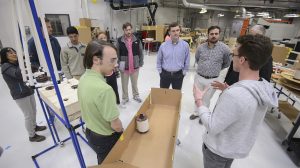
Students in a Manufacturing 254 class present their designs for a class project on the floor of the UM Center for Manufacturing Excellence. Photo by Thomas Graning/Ole Miss Communications
OXFORD, Miss. – The automotive industry serves as a key driver in the state’s economy. More than 200 automotive manufacturers employ 20,000 workers, with annual vehicle production in the state exceeding 500,000.
Several university programs are helping the industry grow and flourish in the state.
The Haley Barbour Center for Manufacturing Excellence at the University of Mississippi has partnered with Toyota and other automotive manufacturing companies to develop training programs and provide unique opportunities for students.
The CME offers a unique undergraduate program that allows students to tailor academic experiences to match their career goals and life objectives, incorporating coursework from the schools of Accountancy, Business Administration and Engineering to give graduates a fundamental understanding of all the disciplines involved in modern manufacturing. This multidisciplinary approach has earned praise from several industries, and graduates of the program attract multiple job offers commanding higher pay than their counterparts from other programs.
Twelve Ole Miss students have formed a campus chapter of the Collegiate Automotive Manufacturing Society. The chapter began in fall 2015 as a result of an idea presented by Ryan Miller, programs manager for the CME and the group’s adviser.
A member of the Mississippi Automotive Manufacturers Association board of directors, Miller suggested to the CME students that they found a collegiate engineering-business-accounting honors society with the state group as the parent association, with a goal of connecting automotive manufacturers with millennials and trying to help the manufacturers better understand them through more direct contact.
At Mississippi State University, the Center for Advanced Vehicular Systems remains a driving force in the growth and maturity of the U.S. automotive industry, pioneering the use of high-performance materials to design cars that offer a premium driving experience while maximizing travel distance from multiple sources of energy.
MSU researchers are pushing the limits of automotive engineering through the development of a self-driving, all-electric sport utility vehicle.
Engineered by a team at MSU’s Center for Advanced Vehicular Systems, the “Halo Project” supercar is designed to showcase MSU’s expertise in automotive engineering and the latest automotive technology. The supercar utilizes an on-board NVIDIA supercomputer that allows the vehicle to navigate on- and off-road terrain without human intervention.
The new vehicle and accompanying research have the potential to accelerate the societal benefits of autonomous vehicles through the creation of safer roadways and accessibility to independent automotive transportation for people with disabilities.
The project builds on a series of MSU automotive research projects, including the “Car of the Future,” an all-electric hybrid that combines superior efficiency, sporty handling and advanced technological features. MSU student, faculty and staff research teams have long been recognized for excellence in projects like “Car of the Future,” competitions such as EcoCAR, and other initiatives that have pushed innovation.
Besides research and development, MSU’s CAVS Extension works with manufacturers across the state such as Nissan, Toyota and their suppliers to make Mississippi manufacturing stronger and more competitive through technology assistance and professional development in areas such as lean manufacturing and Six Sigma. CAVS-E has been a part of every new model launch at both Nissan in Canton and Toyota in Blue Springs through modeling and simulation.
Clients of CAVS-E have reported nearly $6 billion in economic impact along with more than 4,000 jobs created or retained through CAVS and Mississippi’s Manufacturing Extension Partnership program.